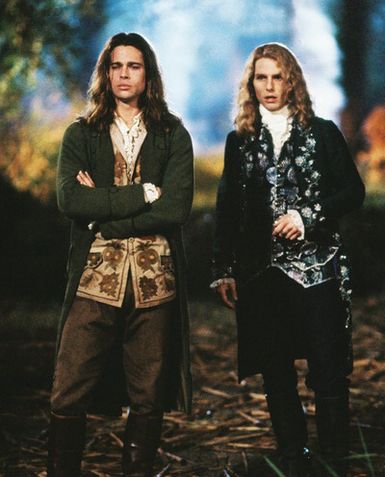
Now I read my fair share of vampiric romance novels in my youth, largely written by Amelia Atwater-Rhodes who published her first novel at 15, which is a pretty good indication of the quality of those books. Anne Rice's work was always known to me, and I greatly wanted to read it, but I never got around to reading any of Rice's novels, nor even seeing more than a few minutes worth of any films based on her writing. And so this week I am familiar with the genre, the general vibe of the supernatural romance, but I am new to the novel, probably the novel that inspired everything Atwater-Rhodes wrote and thus inspired a lot of what I read as a pre-teen.
Interview with the Vampire. Arguably the definitive spiritual-romance novel, this is the one that started it all, sparked the idea of the brooding handsome monster who really just wants to be loved. Louis is that brooding creature, beautiful and deadly, struggling to retain his humanity in an inhuman wolrd. Lestat is the seduction, he is this apparently irresistable creature to whome Louis is constantly drawn, he can never truly escape him so long as his human emotions are retained. And Claudia is that bizarre observation of sexual maturation without the appearance of age, she is eternally youthful in the way she looks but an incredibly adept seductress and vixen who beckons her prey with her vulnerability and then destroys them with a childlike glee. This core trio makes up the novel. There is no real and true plot, it is just a recitation of the tale of Louis' life up to the time of the interview, and so the story is all about the characters. There is no quest on which they embark, the reader is simply invested in the emotional stories of the trio and their personal struggles.
And the investment in the struggles of the characters leads to that attraction, women tend to be suckers for the sensitive guy who's in touch with his feelings. That or they lean to the polar opposite and go for that violent and reckless “bad boy” character. Luckily Rice provides fodder for both of these styles of women in the form of Louis as the intellectual and Lestat as that unknowable loose cannon. In order to keep these two together so that they may play off of eachother Claudia is introduced, and she is that strongly female presence that keeps the two libido's in check, that controlling feminine influence that most female readers imagine they would be if put into that situation. Rice has allowed the reader to insert themselves into the world of the story and imagine themselves romancing with the characters, which they have done in spades through fanfiction and other fan outlets, creating a subculture centered around the world of these novels in which people deeply want to be involved.
Anne Rice has basically created the cast of perfect romantic heroes, and so the readers latch on to the one to whom they are most personally attracted and absorb themselves with that characters life story, thus inserting themselves into that world in their own mind.
No comments:
Post a Comment